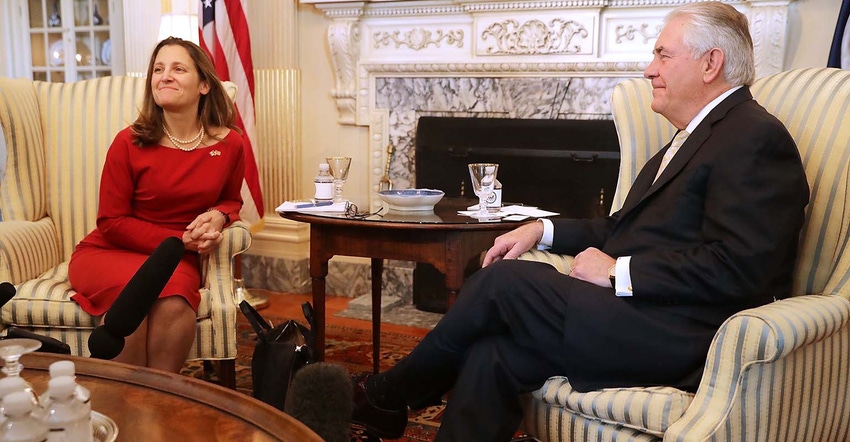
by Greg Quinn and Theophilos Argitis
Foreign Affairs Minister Chrystia Freeland laid out Canada’s core objectives for North American Free Trade Agreement negotiations that begin this week and signaled the country won’t accept “just any deal.’’
Speaking Monday in Ottawa, Freeland said she hopes the three sides -- the U.S., Canada and Mexico -- can keep what is good about the current agreement, while using the negotiations to modernize the pact. Among Canada’s six main goals is a desire to make NAFTA more current to capitalize on a digital revolution and make it “more progressive’’ through stronger labor and environmental protection.
“There may be some dramatic moments ahead,” Freeland said at the University of Ottawa. “Yet I am deeply optimistic about the final outcome.’’
The first round of talks begin Wednesday, with representatives from the three countries gathering in Washington. President Donald Trump has threatened to withdraw from NAFTA if Mexico and Canada don’t agree to more favorable terms for the U.S.
Freeland indicated there could also be some deal breakers for Canada, particularly around a dispute-resolution mechanism for anti-dumping and countervailing duty cases.
“We will come to the table with goodwill, and Canada’s characteristic ability and willingness to seek compromise and find win-win solutions,’’ Freeland said. “But we are committed to a good deal, not just any deal. That will be our bottom line.’’
It’s the country’s most detailed list of goals yet for reworking the agreement that Freeland called an “extraordinary success story,” saying Canada’s economy is 2.5% larger every year than it otherwise would be because of NAFTA.
Prime Minister Justin Trudeau has made NAFTA talks one of his biggest priorities, sending ministers and provincial leaders on dozens of trips to Washington and state capitals to build support for the Canadian side. His enthusiasm for trade stands in contrast to moves in other countries, including the U.S. and the U.K., to step up protectionist measures.
Freeland reiterated her message that the trading relationship between the two countries is balanced, and Canada provides the top export market for the majority of states. Bilateral trade last year totaled $635 billion of goods and services and the U.S. had a surplus of $8.1 billion, she said.
President Trump himself benefits from trade with Canada, Freeland said. “I have said many times now to the American administration that for example the electricity in Trump Tower comes from Quebec,” she said in response to a question at a parliamentary committee after her speech. New York state buys electricity from Hydro-Quebec, a government-owned utility.
Freeland told the lawmakers negotiations on ending U.S. penalties on Canadian softwood lumber exports will run “parallel” to NAFTA talks. Claims by the U.S. that Canada subsidized logging on government-owned land have resulted in half a dozen trade spats since the early 1980s.
Canada will resist new protectionist measures like those found in Trump’s Buy American provisions, and seek to add chapters on gender rights and indigenous people, Freeland said in her speech. She called limiting foreign access to public works projects “political junk food” that ends up hurting economies in the long run.
Other Canadian objectives include “reforming the Investor-State Dispute Settlement process, to ensure that governments have an unassailable right to regulate in the public interest,” and allowing freer movement of professional workers.
Dairy Disputes
Canada’s “national interest” includes protecting its cultural industry and the dairy sector’s “supply management” system. Freeland told reporters after her committee hearing the U.S. exports about five times more dairy to Canada than it imports, and it also shields its farmers from free trade.
Canada, whose NAFTA wish list doesn’t contain aggressive demands for concessions, shares many values with the U.S., so there is “lots of scope” for an agreement, said Debra Steger, a professor of trade law at the University of Ottawa. The talks will likely still take at least a year because behind closed doors Canada will push for trade expansion in areas such as energy and won’t concede on dairy production and Buy American rules, she said.
“She seems to be carving out areas not where the trade agreement would expand market access for Canadian businesses, but rather where limitations would be placed,” Steger said by phone. When it comes to the actual negotiations, “you can’t just play defense all the time.”
The renewed NAFTA must be designed to show clear public benefits in a time of global dissent against open borders, Freeland said, adding automation has had a bigger dislocating effect on workers than trade.
“Too many working people feel abandoned by the 21st Century global economy, and have voted accordingly, abandoning the modern liberal vision of trade and growth and openness to the world,” she said. “Too many towns and too many lives across the industrialized world have been blighted by factory closings and precarious work.”
--To contact the reporters on this story: Greg Quinn in Ottawa at [email protected]; Theophilos Argitis in Ottawa at [email protected]
To contact the editors responsible for this story: Theophilos Argitis at [email protected]
Chris Fournier, Stephen Wicary
© 2017 Bloomberg L.P
About the Author(s)
You May Also Like




